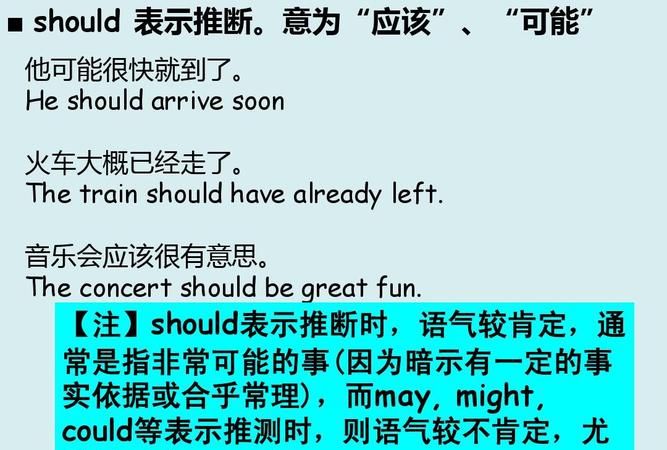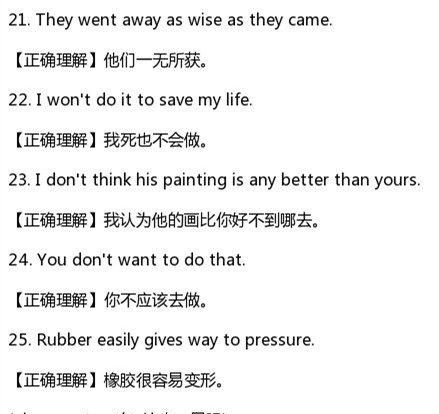本文目录
初中英语反意疑问句的用法归纳
for him to do it, is it?
一、反意疑问句的意义及其构成
反意疑问句又叫附加疑问句,是指当提问的人对前面所叙述的事实不敢肯定,而需要向对方加以证实时所提出的问句。其结构为:前一部分是一个陈述句,后一部分是一个简单的问句。完成后一部分简单问句时,要根据前面陈述句的动词时态和人称来选择适当的助动词进行提问,前后两部分的人称和动词时态要保持一致。如果前一部分用肯定式,后一部分一般用否定式;反之,前一部分为否定式,后一部分要用肯定式,即“前肯定后否定,前否定后肯定”。
例 You have been to Beijing, haven’t you? 你去过北京,是吗?
二、简单句式结构中反意疑问句的运用
反意疑问句运用于简单句式结构中时,我们应注意掌握以下几个方面
1、当陈述句部分的主语是名词时,反意疑问句的主语必须用人称代词来代替。
例 Your brother has gone to the library, hasn’t he? 你弟弟去图书馆了,是吗?
2、当陈述句的主语是指示代词this, that时,反意疑问句的主语用it代替;指示代词是these, those时,反意疑问句的主语用they代替。
例 That isn’t a useful book, is it? 那不是一本有用的书,是吗?
These are important reading materials, aren’t they? 这些都是重要的阅读材料,是吗?
3、当陈述句部分是I am…时,反意疑问句部分通常要用aren’t I;如陈述句部分的主语是I am not时,反意疑问句部分通常要用am I。
例 I’m late for the meeting, aren’t I? 我开会迟到了,是吗?
I’m not doing well, am I? 我干得不好,是吗?
4、当陈述部分是everyone / everybody, someone / somebody, no one / nobody, none等表示人的不定代词时,反意疑问句部分的主语多用they,但也可用he;当陈述部分的主语是everything, anything, something, nothing等表示物的不定代词时,反意疑问句部分的主语用it。
例 Nobody came when I was out, did they? 我在外时,没人来过,是吗?
Everything has gone wrong today, hasn’t it? 今天什么都出问题了,是不是?
5、当陈述部分是“there be + 主语 + 其它”结构时,反意疑问部分要用“be (not) + there”结构。
例 There are some bananas in the basket, aren’t there? 篮子里有些香蕉,是吗?
6、当陈述部分的谓语动词是have时,有两种情况 。
(1)have作“有”解时,反意疑问句部分可用have(not)或do(not)的相应形式。
例 His brother has a new bike, hasn’t (doesn’t) he? 他弟弟有一辆新自行车,是吗?
(2)have用作实义动词时,反意疑问句部分只可用do(not)的相应形式。
例 We have to start early, don’t we? 我们必须早点出发,是吗?
7、当陈述部分有hardly, scarcely, barely, rarely, seldom, few, little, no, never, nothing, nobody, nowhere等否定词或半否定词时,反意疑问句部分要用肯定形式。
注 如果陈述句部分是带有否定前缀或后缀时,反意疑问句部分仍用否定结构。
例 It’s impossible for him to make such a mistake, isn’t it? 他不可能犯这样的错误,是吗?
8、当陈述部分有情态动词ought to时,反意疑问句部分要用ought / should (oughtn’t / shouldn’t);如陈述部分为情态动词used to,反意疑问部分可用 used或did;如陈述部分为had better,反意疑问部分用hadn’t或shouldn’t。
例 Such things ought not to be allowed, ought they? 这种事是不允许的,是吗?
You’d better do it by yourself, hadn’t / shouldn’t you? 你最好自己做,好吗?
9、当陈述句部分有情态动词must时,反意疑问部分有四种情况
(1)must表示“必须、禁止“时,反意疑问部分要用must (mustn’t) 。
例 You mustn’t stop your car here, must you? 你不能把车停在这地方,知道吗?
(2)must表示“有必要”时,反意疑问句部分要用needn’t。
例 They must finish the work today, needn’t they? 他们今天必须要完成这项工作,是吗?
(3)当must用来表示对现在的情况进行“推测”时,反意疑问部分要根据must后面的动词采用相应的形式。
例 He must be good at maths, isn’t he? 他数学一定学得很好,是吗?
(4)当must用来表示对过去的情况进行“推测”(must + have done)时,如强调对过去情况的推测(一般句中有过去的时间状语),反意疑问句部分要用“didn’t + 主语”;如果强调动作的完成(一般没有过去时间状语),反意疑问句部分要用“haven’t / hasn’t + 主语”。
例 She must have read the novel last week, didn’t she? 她上星期一定读了这本小说了,是吗?
You must have told her about it, haven’t you? 你一定把这事告诉她了,是吗?
10、当陈述部分的谓语动词是表示愿望的wish时,反意疑问部分要用may,而且前后两个部分均用肯定式。
例 I wish to go to the moon by spaceship some day, may I? 我希望总有一天能乘宇宙飞船去月球。
11、感叹句的反意疑问句一律使用否定式,并用be的一般现在时形式。
例 What a foolish child (he is), isn’t he? 多傻的孩子啊,不是吗?
三、并列分句结构中反意疑问句的运用
当陈述句是由并列连接词and, but, or, for, so等连接的两个并列分句组成时,反意疑问句部分一般与最接近的分句保持一致,也就是说,对后一分句进行反问。
例 He was a lazy child, and he didn’t pass the exam, did he? 他是一个偷懒的孩子,他没能通过考试,是吗?
四、复合句结构中反意疑问句的运用
反意疑问句用于主从复合句结构中时,要注意以下三种情况
1.一般情况下,陈述句部分是主从复合句时,反意疑问句部分的代词和助动词应与主句中的主语和动词保持一致。
例 This is the second time that he has been to Japan, isn’t it? 这是他第二次去日本,是吗?
2.在宾语从句中,如果陈述句部分是“I think (believe, suppose, imagine, expect等) + 宾语从句”, 反意疑问句部分应与宾语从句的主谓保持一致,并要注意否定转移。
例 I don’t think you have heard of him before, have you? 我认为你以前没有听说过他,是吗?
注 当think等这些动词的主语不是第一人称,或主语是第一人称,而动词时态不是一般现在时或一般过去时,这时,反意疑问句的助动词和人称代词要与主句保持一致。
例 Mary thinks you will come to the party, doesn’t she? 玛丽认为你将来参加晚会,是吗?
3.当陈述句部分为主语从句时,反意疑问句的主语用it。
例 That he didn’t pass the entrance exam made his parents very angry, didn’t it? 他没有通过入学考试使得他的父母十分生气,是吗?
五、祈使句结构中反意疑问句的运用
祈使句反意疑问句的构成,必须按其句子结构及讲话人的语气来决定其反意部分,有四种形式。
1.祈使句的肯定形式,其反意问句表示“请求”时,通常用will you;表示“邀请、劝说”时,用won’t you。
例 Be sure to write to us, will you? 一定要给我们写信,好吗?(表示“请求”)
Come to have dinner with us this evening, won’t you? 今晚跟我们一起来吃饭,好吗?(表示“邀请”)
2.祈使句的否定形式,其反意疑问句通常只用will you构成。
例 Don’t smoke in the meeting room, will you? 请不要在会议室抽烟,好吗?
3.变异祈使句,即句首为一呼语,后接第二人称代词引导的一个一般现在时的陈述句,这时,我们应视为无主语的祈使句结构,反意疑问句部分要用will you构成。
例 Mike, you take all these tables out of the next room, will you? 迈克,你把这些桌子都搬出隔壁房间,好吗?
4. Let开头的祈使句,构成反意疑问句时,除Let’s用shall we构成反意疑问句外,其它均用will you。
例 Let the boy go first, will you? 让那男孩先走,好吗?
Let’s take a walk after supper, shall we? 晚饭后,我们去散步,好吗?
六、反意疑问句的回答
对反意疑问句的回答,无论问题的提法如何,如果事实是肯定的,就用yes,事实是否定的,就要用no。要特别注意陈述句部分是否定结构,反意疑问句部分用肯定式提问时,回答yes或no与汉语正好相反。这种省略回答的yes要译成“不”,no要译成“是”。
例 ---He likes playing football, doesn’t he? 他喜欢踢足球,是吗?
---Yes, he does. / No, he doesn’t. 是的。/ 不是。
---His sister didn’t attend the meeting, did she? 他妹妹没有参加会议,是吗?
---Yes, she did. / No, she didn’t. 不,她参加了。/ 是的,她没参加。反意疑问句的基本构成形式是:陈述句,助动词(肯定或否定)+主语?
如:①She often has lunch at school, doesn’t she? ②You don’t like sports, do you?
使用反意疑问句要注意以下若干对应规则:
一、 反意疑问句中问句部分的动词与陈述部分的动词在语气上成相反的对应关系,即:前肯后否;前否后肯
如:①You can’t do it, can you? ②They are very late for the meeting, aren’t they?
二、 反意疑问句中问句部分的助动词和主语应与陈述部分的助动词和主语种类要对应一致。
如:①He has supper at home every day, doesn’t he? (不能用hasn’t he?) ②They have known the matter, haven’t they? (不能用don’t they?)
三、 反意疑问句中问句部分的主语只能用人称代词主格( I ; we ; you ; he ; she ; it ; they )
如:① Tom can dive, can’t he ? ② Your dog calls Xiaohei, doesn’t it ?
四、反意疑问句的陈述部分带有little, few, never, hardly, seldom , rarely , nothing , nobody 等否定意义的词时,问句部分用肯定式。
如: ①She never tells a lie, does she?(不用doesn’t she?) ②He was seldom late, was he?(不用wasn’t he?)
五、 反意疑问句的陈述部分含有由un-, im-, in-, dis-, 等否定意义的前缀构成的词时,陈述部分要视为肯定含义,问句部分用否定形式。如: ①Your father is unhappy, isn’t he?(不能用is he?) ②The man is dishonest, isn’t he? (不能用is he?)
③It is impossible to learn English without remembering more words, isn’t it?(不能用is it ?)
六、反意疑问句的陈述部分为I am……时,问句部分习惯上用aren’t I?表示。如: I am a very honest man, aren’t I?
七、主从复合句的反意疑问句有以下四种情况:
(1) 并列复合句疑问部分,助动词应与邻近从句的谓语一致.
如:Mr. Smith had been to Beijing for several times, he should have been in China now, shouldn’t he?
(2) 带有定语从句或宾语从句的主从复合句,问句部分的动词和主语与陈述部分的主句动词和主语保持一致。
如: ①They all think that English is very important, don’t they? (不用isn’t it?)
②He didn’t think that the news was true, did he? (不用wasn’t/ was it?)
(3) 带有定语从句或宾语从句的主从复合句,若其陈述部分为I(We) think(believe, suppose, consider, expect) + that从句及其否定形
式时,问句部分的动词及主语与that从句内的动词和主语保持一致。
如:① I think that he has done his best, hasn’t he? ② We think that English is very useful, isn’t it? (不用don’t we?)
③ I don’t think that you can do it, can you? (不用do I?) ④ We don’t believe that the news is true, is it? (不用do we?)
八、陈述部分的主语为动名词或不定式时,问句的主语用it代替。
如:①To do one good deed is easy for a person, isn't it? ②Skating is your favorite sport, isn't it?
九、陈述部分的主语为从句时,问句部分的主语一般用it代替
如: ①What he said is true, isn't it? (不用didn’t he?) ②Where we will build the dam has not been decided yet, has it? (不用won’t we?)
十、陈述部分的主语是this ; that 时,疑问部分的主语用it ; 陈述部分的主语是these ; those 时,疑问部分的主语用they
如:① That’s your sister, isn’t it ? ② These were building workers, weren’t they ?
十一、陈述部分的主语为不定代词something, anything, nothing, everything时,问句部分的主语用it。
如:①Something is wrong with the computer, isn’t it? ②Nothing has happened to them, has it?
十二、陈述部分的主语为不定代词somebody(someone), anybody(anyone), nobody(no one), everybody(everyone)时,问句部分的主语用he或 they,这时问句动词的数应和he或 they一致。
如:①Someone has taken the seat, hasn’t he? ②Everyone has done their best in the game, haven’t they?
十三、陈述部分为祈使句时,除以Let’s……引导的问句部分shall we? 如: Let’s go home together, shall we? 外,其余祈使句(无论肯、否定),问句部分一般用will you?形式表示请求
如:①Let us stop to rest, will you? ②You feed the bird today, will you?
③Please open the window, will you? ④ Don’t make any noise, will you?
十四、陈述部分用One做主语时,疑问部分的主语有正式场合用one, 在非正式场合用you.
如: One should be polite to the old , shouldn’t one / shouldn’t you ?
十五、陈述部分为There (Here) + be + 主语时,问句部分用:be(not)+there(here)?形式。但当其中有其它助动词时,则用其它助动词+there?如:①There are two cakes on the plate, aren’t there? ②Here is a story about Mark Twain, isn’t here?
③ There will be a concert tonight , won’t there ?
十六、陈述部分含too…to…结构,疑问部分用肯定形式。如:The little boy is too young to go to school, is he ?
十七、在 “It is … that …”句型中,疑问部分用isn’t it ? 如: It’s the third time that you have been here, isn’t it ?
十八、陈述部分的谓语是wish (to do )时,疑问部分用 may+主语? 如:I wish to have a word with you , may I ?
十九、陈述部分用had better +原形动词表示建议时,问句部分用hadn’t +主语?形式。
如:①You’d better tell him about the matter, hadn’t you? ②We had better do it by ourselves, hadn’t we?
二十、陈述部分用主语+used to时,问句部分用didn’t + 主语?或usedn’t +主语?形式。
如:①He used to live in the country, didn’t he?/usedn’t he? ②They used to be good friends, didn’t they?/usedn’t they?
1 ABDDA 6.CCABB 11.DAAAD
二十一、陈述部分含must的反意疑问句
(1) 当用must(may, might) + have + V-ed表示推测时,若句中带有明显的过去时间的状语,问句部分动词用过去时形式did.
如: ①He might have forgotten his pen in the classroom yesterday, didn’t he? (不用mightn’t he?/ hasn’t he?)
②You must have got up late this morning, didn’t you?(不用mustn’t you?/haven’t you?)
(2) 当用must(may, might) + have + V-ed表示推测时,若句中没有带明显的过去时间的状语,问句部分动词用现在完成时形式
如:①Everyone must have known the death of the waitress, haven’t they? (不用mustn’t they/ didn’t they ?)
②You must have worked there, haven’t you?(不用mustn’t you?/ didn’t you?)
(3) 当must表“必须”时,疑问部分用mustn’t. 如:We must obey the laws, mustn’t we ?
(4) 当must表“有必要”时,疑问部分用needn’t. 如:You must finish your homework first, needn’t you?
(5) 当must be表“一定、必定”时,疑问部分助动词就用be. 如:He must be very tired after running, isn’t he ?

赠人玫瑰手有余香的英文怎么说
Let me introduce it to you. it改成THEM,复数。
He just told her that if she read ‘ESIO TROT’to her tortoise,the tortoise will grow up faster.后面的时态不一致,will改成would。
Finally,Mrs silver found that this was Mr Hoppy's tortoise。this 改成it。
She felt so touch and married with him. touch加ed,married后面不用跟with。
I have learnt that helping others is good for each other.前面帮助的是其他人,并不是特指两个人,所以后面不要说each other。
文章很有趣。

英语翻译
有这样两个句子。⑴The engine did not stop because the fuel was finished.⑵John did not attend the meeting because he was ill. 请问否定词not究竟否定句子的哪个部分?怎样翻译这两个句子?翻译这一类型的句子需注意什么问题?
because 是从属连词(subordinating conjunction),其意为:“因为……”(for the reason that ,used to give a reason for something ), 引出原因状语从句(adverbial clause of cause ),语气最强,说明主句行为、动作的原因或理由,既可以置于主句之后,也可以位于主句之前以示强调,这是because 的基本用法。如:⑶I love her all the more because she has faults.⑷Because he couldn’t see a cell through the microscope ,the professor readjusted it for him.但是当主句在前,且谓语动词为否定形式时,若否定because引导的从句,则可意为:“不是因为……才(而)……”。如:⑸I didn’t got because I was afraid.(我不是因为害怕才去的。)(6)I did not leave home because I was afraid of my father.(我不是因为害怕父亲才离家的。)同样,上述两句若不是否定because 引导的从句,而仅是否定形式的主句,那也可意为:“我没去,因为我害怕。”和“我没有离开家,因为我害怕父亲。”可见,not...because...是一个有歧义的结构,究竟如何理解或翻译这种句子,这就要看句子是否符合常理,是否合乎情理和上下文的寓意逻辑来决定了。如:⑺I did not buy it because the price was exorbitant.(我没有买它,因为它的价格太贵了。)⑻I can’t come out tonight because I’ve got too much homework.(我今天晚上不能外出了,因为我的家庭作业太多了。) ⑼Certainly I do not teach because teaching is easy for me.(Teaching is the most difficult of the various ways I have attempted to earn my living ,mechanic, carpenter, writer.)根据上下文,not 显然是否定because所引导的从句。该句应意为:“当然,我不是因为我觉得教书轻松才教书的。(对我来说,教书是个会令人熬红眼睛、手掌出汗、精神沮丧的职业。)”而有时在没有上下文的情况下,这类句子就可能有两种不同的意思,除例句⑸和例句(6)外,又如:⑽I was not kind to him because he was poor.“我不是因为他贫穷,才对他亲切的。”(对他亲切是因为别的理由)或“我对他不亲切,是因为他贫穷。”那么,为了准确的表达或避免歧义,在主句和because引导的从句之间用逗号隔开就可以了,即在书面语中,because之前如有逗号,则not显然否定其后的动词,不可能否定逗号后面的because从句。若because之前没有逗号,not否定什么就只能取决于是否合乎情理和上下文了。如⑾He did not leave , because he was hungry .(他没有离开,因为它肚子饿了。)⑿He did not leave because he was hungry .该句可与句⑾意思相同,但也可意为:“他不是因为肚子饿才离开的。”(而是因为别的原因而离开的,这须由上下文而定)⒀Raven did not leave the party early, because Carol was there .

should和shall的区别用法
一、作时态助动词时使用上的不同
should是shall的过去式。shall引导一般将来时用在第一人称(英国英语);should用来过去将来时用在第一人称(英国英语,已经不常见)。
二、作情态动词时使用上的不同
1、should的用法
(1)(表示语气较强的假设)万一,竟然
If the car should break down on the way, you would have to walk back.
万一汽车中途抛锚,你就得走回来。
(2)(表示可能性、推测、推论或期待)可能,该
She should be here any minute.
她该马上就到。
(3)(表示义务、责任)应该,应当
You should do as she says.
你应当照她说的去做。
(4)(表示委婉、谦逊)可,倒
2、shall用法
(1)(用在问句中表示征求对方意见,主要用于第一、第三人称)...好吗?要不要...?
Shall we begin now?
我们现在开始好吗?
(2)(用于陈述句中的第二、第三人称,表示说话人的意图、允诺、警告、命令、决心等)必须,应,可
You shall have it back next week.
下星期一定还你。
三、词性不同
should是一个情态动词,表示“应该怎样” 。
shall用于第一人称,表征求对方意见或向对方请示,用于第二,第三人称,表示说话人给对方的命令,警告,允诺或威胁 。

扩展资料:
shall用法
(1)(用在问句中表示征求对方意见,主要用于第一、第三人称)...好吗?要不要...?
Shall we begin now? 我们现在开始好吗?
(2)(用于陈述句中的第二、第三人称,表示说话人的意图、允诺、警告、命令、决心等)必须,应
You shall have it back next week. 下星期一定还你。
(3)(用在条约、规章、法令等文件中表示义务或规定,一般用于第三人称)应,必须
Intruders shall be punished. 非法闯入者将遭处罚。
以上就是关于合乎常理的英文 ,初中英语反意疑问句的用法归纳的全部内容,以及合乎常理的英文 的相关内容,希望能够帮到您。

